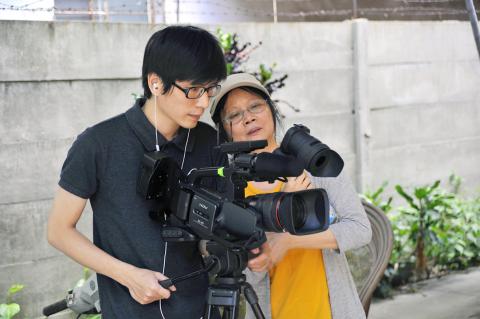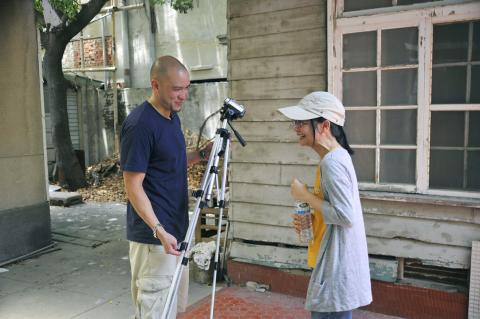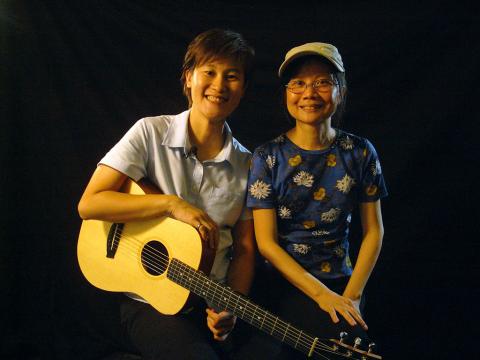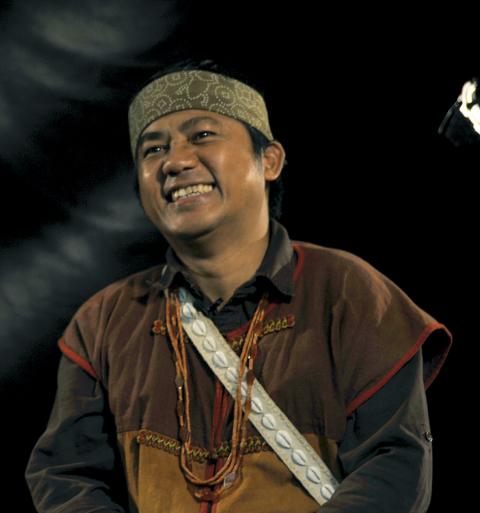Dear Taiwan (好國好民) opens with a short statement that captures the complexity of its subject: “Who am I is a simple question, with no simple answer for Taiwanese people.”
Directed by filmmaker and social activist Chen Lih-kuei (陳麗貴), the film, which premiered last week at National Taiwan University, focuses on the issue of Taiwanese identity among people who came of age during the end of the martial law era. Starting today at 7:30pm, Dear Taiwan will be shown every Thursday and Saturday at Cafe Philo’s (慕哲咖啡館) new location on Shaoxing North Street (紹興北街), Taipei City, until Dec. 3. The film is also available for independent screenings with English, Chinese and Japanese subtitles (for more information about obtaining a DVD and a schedule of additional screenings, visit deartaiwan.blogspot.com).
The background of Chen’s interviewees reflects the diversity of ethnicities and cultures in this country, including Hoklo, Hakka, Aboriginal and waishengren (外省人, or descendants of people who immigrated from China after the Chinese Civil War). One, activist Ahbying (阿明), also known as Eric Chang (張浩明), grew up in the US. Several musicians whose work deals with Taiwan’s cultural identity and independence are featured, including Fan Chiang (范姜) and fishLIN of hip-hop group Kou Chou Ching (拷秋勤) and Freddy Lim (林昶佐) of Chthonic (閃靈).

Photo Courtesy of Dear Taiwan
Many of Dear Taiwan’s subjects talk about the emotional upheaval they felt as they began to question what they had been taught in school during the martial law era, or as their own sense of national and cultural identity began to conflict with that of close family members.
Linus Pu’s (濮思明) father came to Taiwan with the Chinese Nationalist (KMT) army when he was 19 years old. Pu says his parent’s desire to see China and Taiwan unified was on par with his wish to see his two sons grow up. As Pu became active in social movements, however, his support of Taiwanese independence was cemented despite his loyalty to his father, who passed away when Pu was a teenager.
“I was nurtured by a land called Taiwan, so I call myself Taiwanese,” says Pu in the film.

Photo Courtesy of Dear Taiwan
Chen says she began to think of her own identity while working in Chicago as a reporter for a US-based Chinese-language newspaper during the late 1980s. During a chat with a fellow Taiwanese expat, Chen told her friend about studying Mandarin in school when the Chinese Nationalist government forbade the teaching of other dialects. Though Chen’s mother, born in 1925 and educated during the Japanese colonial era, was not fluent in Mandarin, she forced herself to speak it with her children instead of her native Hoklo (commonly known as Taiwanese).
“I told my friend how impressed I was that my mother started speaking Mandarin to us,” Chen recalls. “But then my friend asked me, ‘Didn’t you ever think it was because your mother did not want you to look down on her?’”
“It hurt me so much to hear that,” says Chen. “That’s when the process of thinking about Taiwanese identity started for me.”

Photo Courtesy of Dear Taiwan
Some of Dear Taiwan’s interviewees recall the shock of learning about events like the 228 Incident after martial law was lifted. Chthonic lead vocalist Lim says his teachers quietly encouraged their students to seek out alternative sources of information besides their textbooks. When what he read in academic journals published abroad conflicted with what he had been taught about Taiwan’s history in school, Lim felt confused.
“That invalidated my life as I knew it,” Lim says in the film.
In an interview with the Taipei Times after the film’s premiere screening on Oct. 19, Lim said he hopes the film will reach a global audience.

Photo Courtesy of Dear Taiwan
“I think people from around the world need to see it. Because when you talk to Taiwanese people, it should be like when you talk to Irish people or Quebecois people,” says Lim. “You can’t say Irish people are English or that all Quebecois are Canadian when many of them feel that Quebec is a country within a country.”
The movie’s US promotional team is currently seeking venues across that country, in part to reach out to younger people of Taiwanese descent, says Herbert Chang (張皓博), one of the film’s English language translators.
“[Dear Taiwan] paints a better picture of who the Taiwanese people are. Yes it is confusing, but the film does a good job of illustrating exactly why it is confusing, and therefore the importance of the topic,” said Chang in an e-mail interview.
One segment of Dear Taiwan focuses on a debate held at Cafe Philo with about 40 Taiwanese and Chinese university students. During the event, which was organized by the Youth Synergy Taiwan Foundation (青平台), participants expressed opinions ranging from the belief that unification is necessary for stability in East Asia to “the Republic of China died in 1949.”
Despite the heated discussion, Chen says the atmosphere at the debate, which took place in June, was relaxed. She adds that there were several Chinese students who supported Taiwanese independence, but were wary about saying so on camera.
“I was surprised, because if I want to talk to people from my own generation [about Taiwanese identity and independence], especially if we are from different backgrounds, I would feel a little bit uncomfortable and worried that I would hurt their feelings,” she says.
“But [at Cafe Philo], everyone was very open and honest, which is why I included so much footage from it. I want people to realize that this kind of discussion is not frightening.”
Chen hopes that message will reach people across the political spectrum. She recalls speaking with a student after the National Taiwan University screening.
“She told me that everyone in her home supports the KMT, so she felt uneasy at first. She thought she would be surrounded by people who were completely different, culturally, from her,” says Chen.
“But after she saw the movie, she told me she thought it was very rational and she felt she could relate to it,” says Chen. ”She thanked me, but I actually felt very thankful for what she said, because my goal is to encourage more people to think about this issue.”
EVENT INFO
WHAT: Dear Taiwan at Cafe Philo (慕哲咖啡館). Chen Lih-kuei (陳麗貴) will participate in a question and answer session after the film
WHEN: Tonight at 7:30pm. Additional screenings will take place Thursdays at 7:30pm and Saturdays at 5pm at Cafe Philo until Dec. 3
WHERE: 3 Shaoxing N St, Taipei City (台北市紹興北街3號)
ADMISSION: Free
ON THE NET: For a schedule of additional screenings, visit deartaiwan.blogspot.com. The Cafe Philo screenings will have Chinese subtitles. The film is available with Chinese, English and Japanese subtitles for independently arranged events. For more information, visit the film’s Web site or send an e-mail to contact.deartaiwan@gmail.com

Eric Finkelstein is a world record junkie. The American’s Guinness World Records include the largest flag mosaic made from table tennis balls, the longest table tennis serve and eating at the most Michelin-starred restaurants in 24 hours in New York. Many would probably share the opinion of Finkelstein’s sister when talking about his records: “You’re a lunatic.” But that’s not stopping him from his next big feat, and this time he is teaming up with his wife, Taiwanese native Jackie Cheng (鄭佳祺): visit and purchase a

April 7 to April 13 After spending over two years with the Republic of China (ROC) Army, A-Mei (阿美) boarded a ship in April 1947 bound for Taiwan. But instead of walking on board with his comrades, his roughly 5-tonne body was lifted using a cargo net. He wasn’t the only elephant; A-Lan (阿蘭) and A-Pei (阿沛) were also on board. The trio had been through hell since they’d been captured by the Japanese Army in Myanmar to transport supplies during World War II. The pachyderms were seized by the ROC New 1st Army’s 30th Division in January 1945, serving

The People’s Republic of China (PRC) last week offered us a glimpse of the violence it plans against Taiwan, with two days of blockade drills conducted around the nation and live-fire exercises not far away in the East China Sea. The PRC said it had practiced hitting “simulated targets of key ports and energy facilities.” Taiwan confirmed on Thursday that PRC Coast Guard ships were directed by the its Eastern Theater Command, meaning that they are assumed to be military assets in a confrontation. Because of this, the number of assets available to the PRC navy is far, far bigger

The 1990s were a turbulent time for the Chinese Nationalist Party’s (KMT) patronage factions. For a look at how they formed, check out the March 2 “Deep Dives.” In the boom years of the 1980s and 1990s the factions amassed fortunes from corruption, access to the levers of local government and prime access to property. They also moved into industries like construction and the gravel business, devastating river ecosystems while the governments they controlled looked the other way. By this period, the factions had largely carved out geographical feifdoms in the local jurisdictions the national KMT restrained them to. For example,